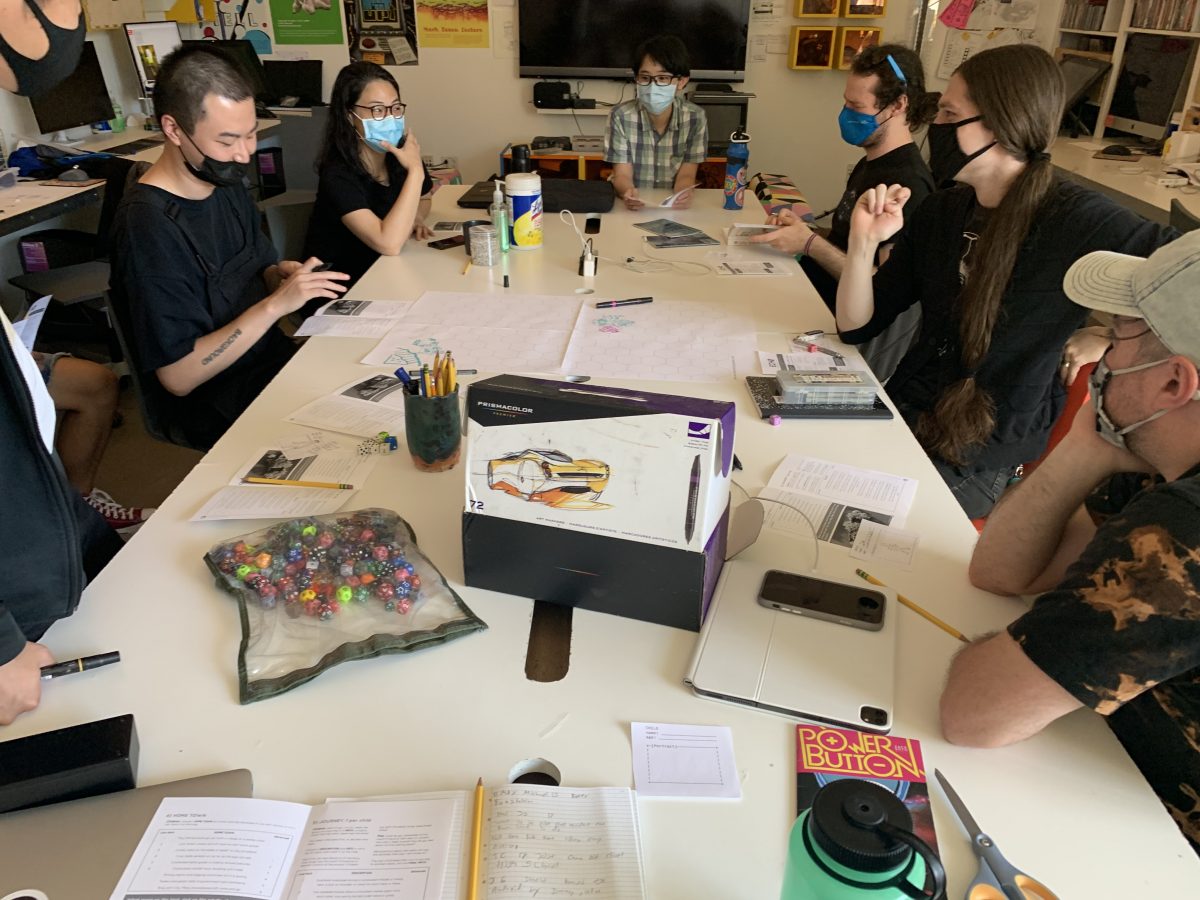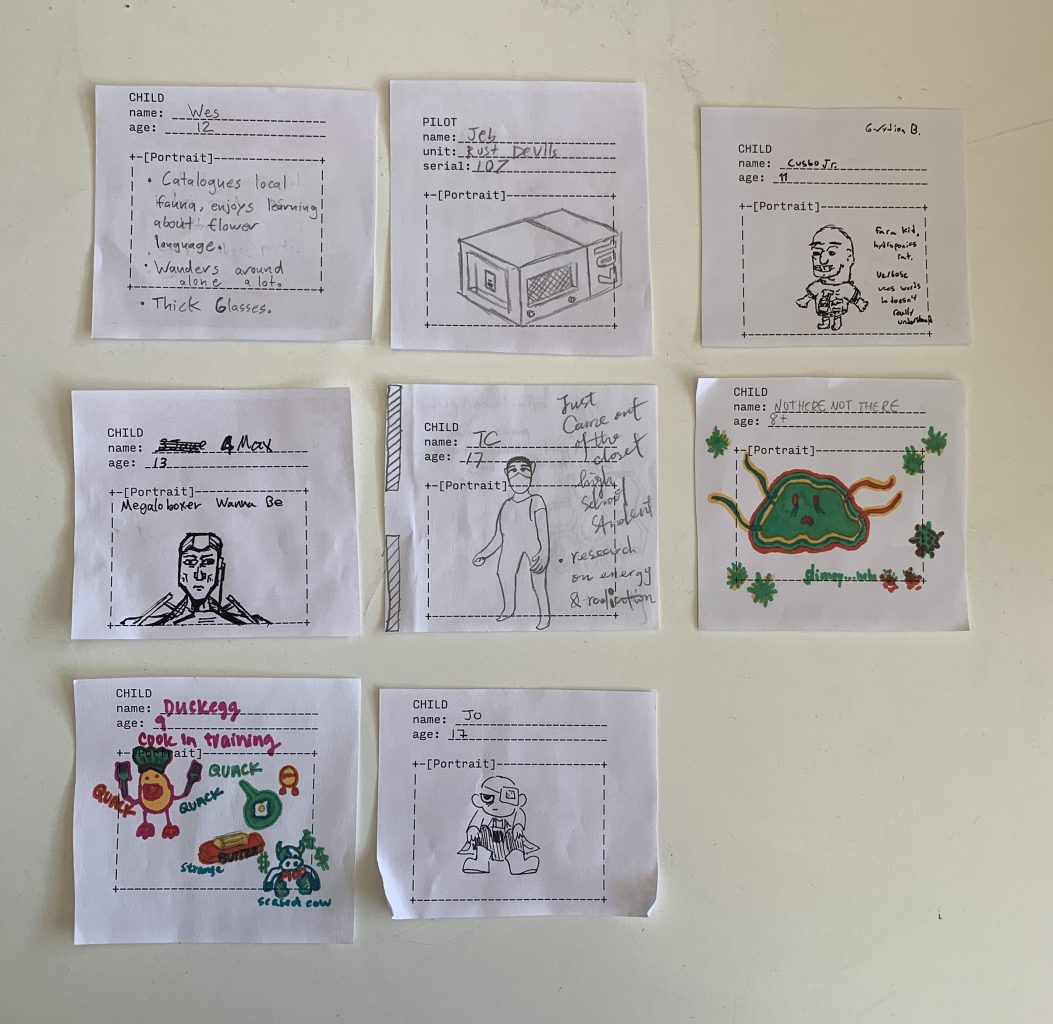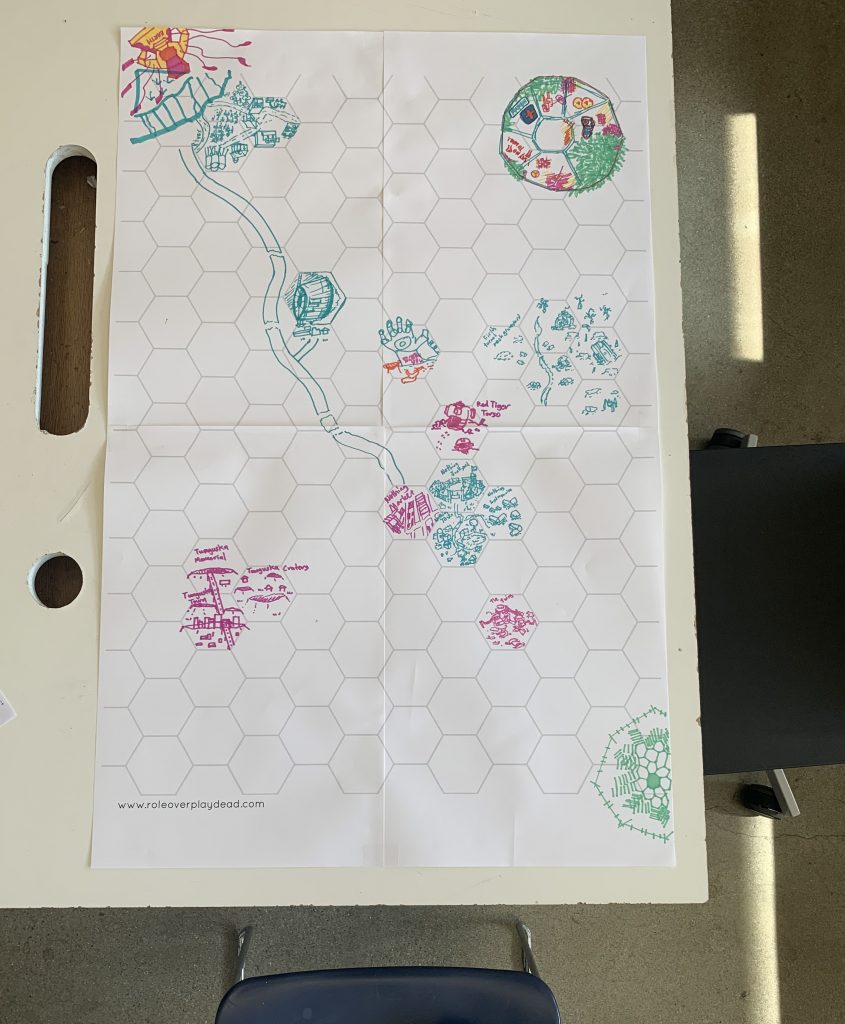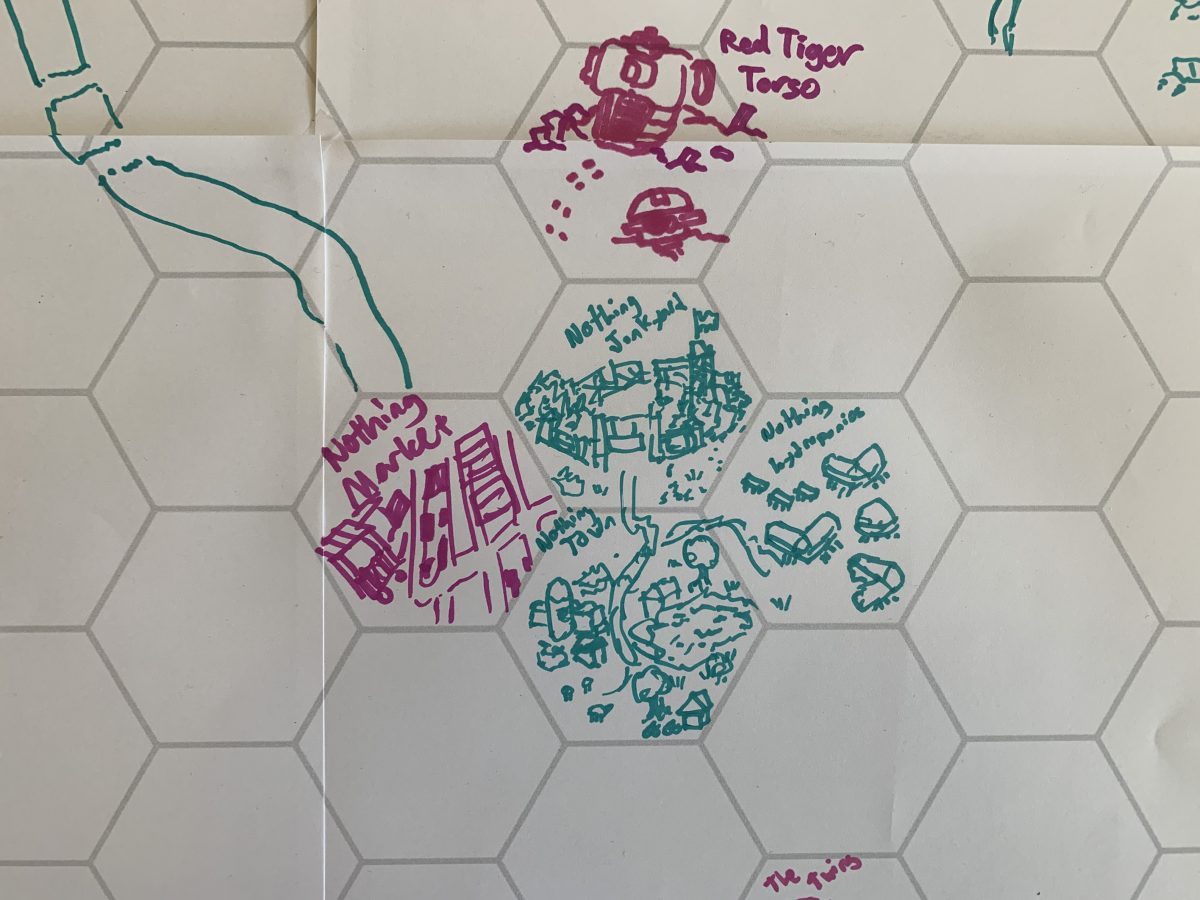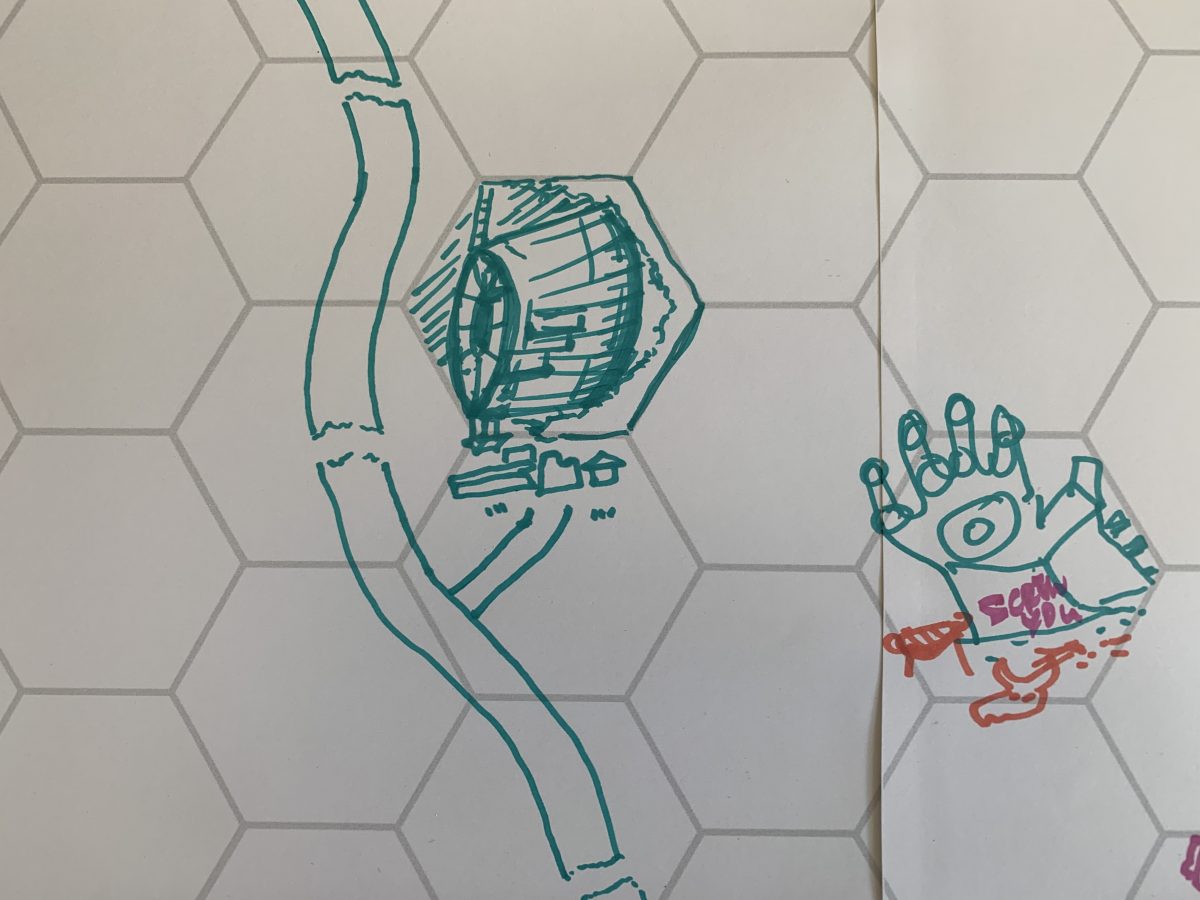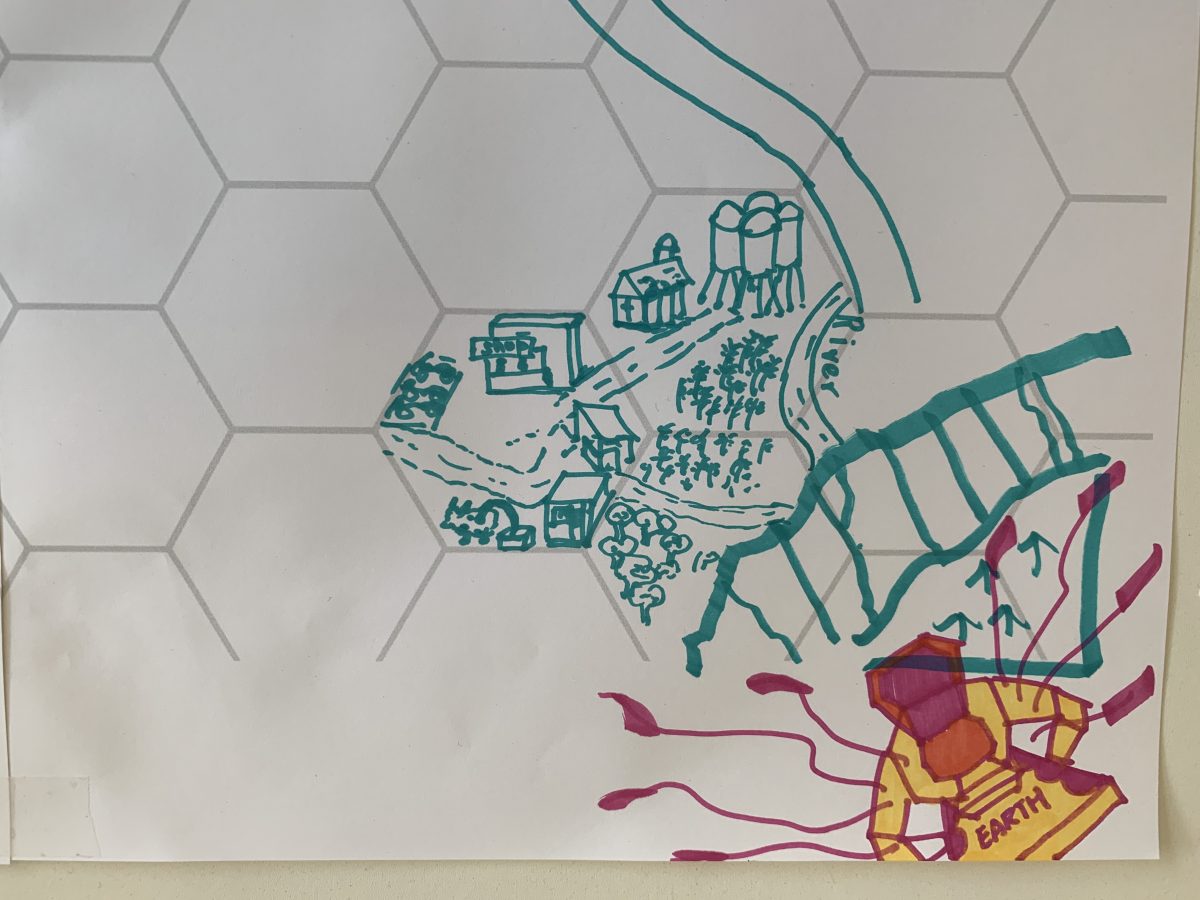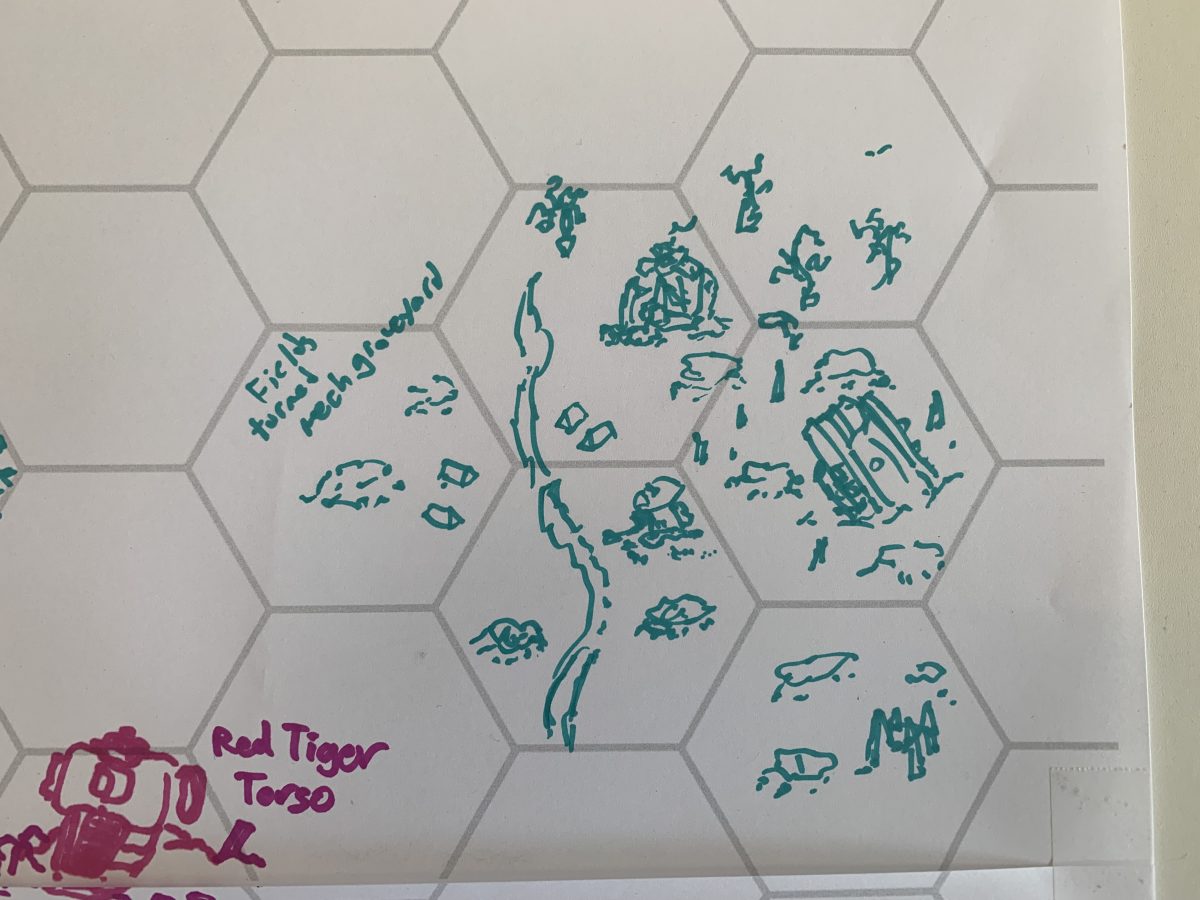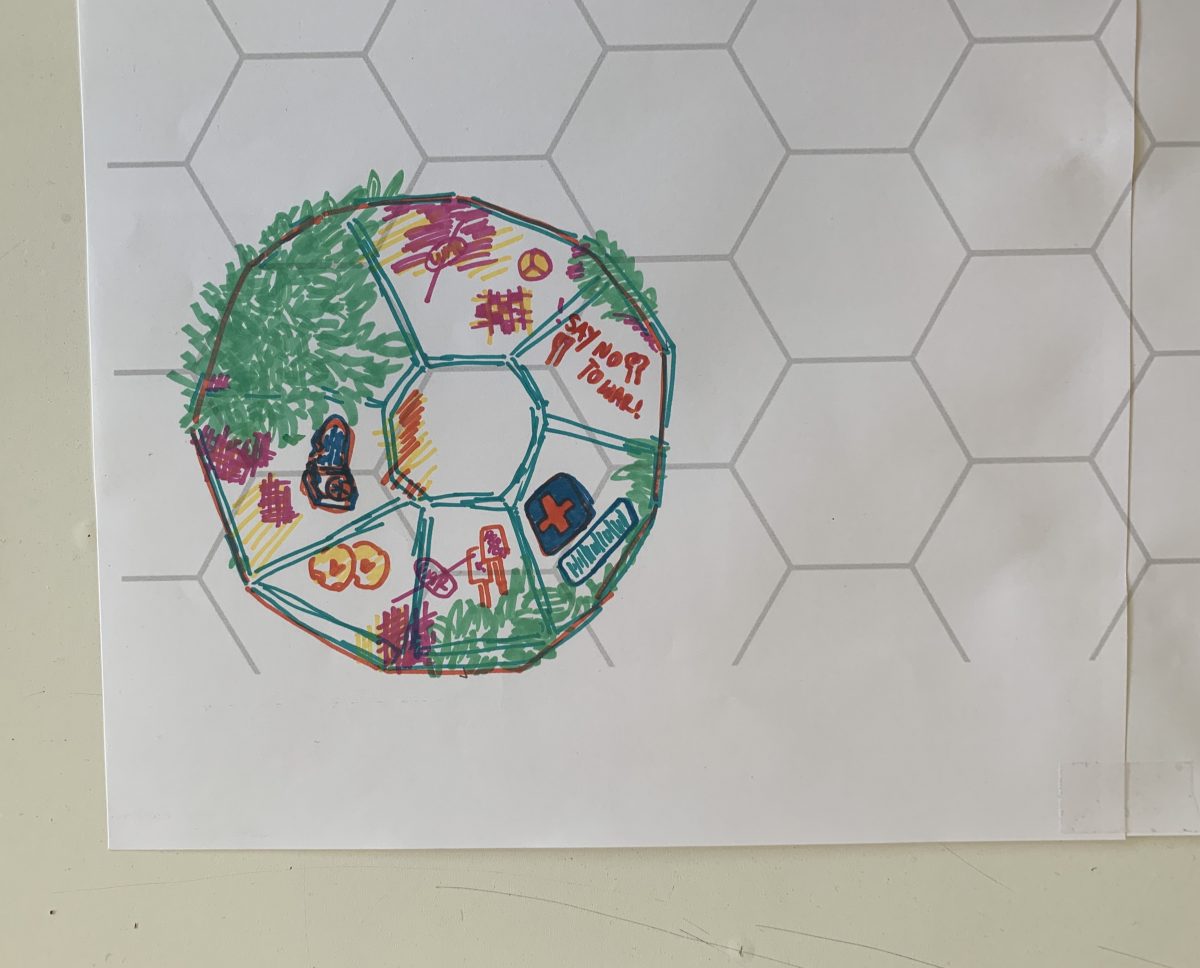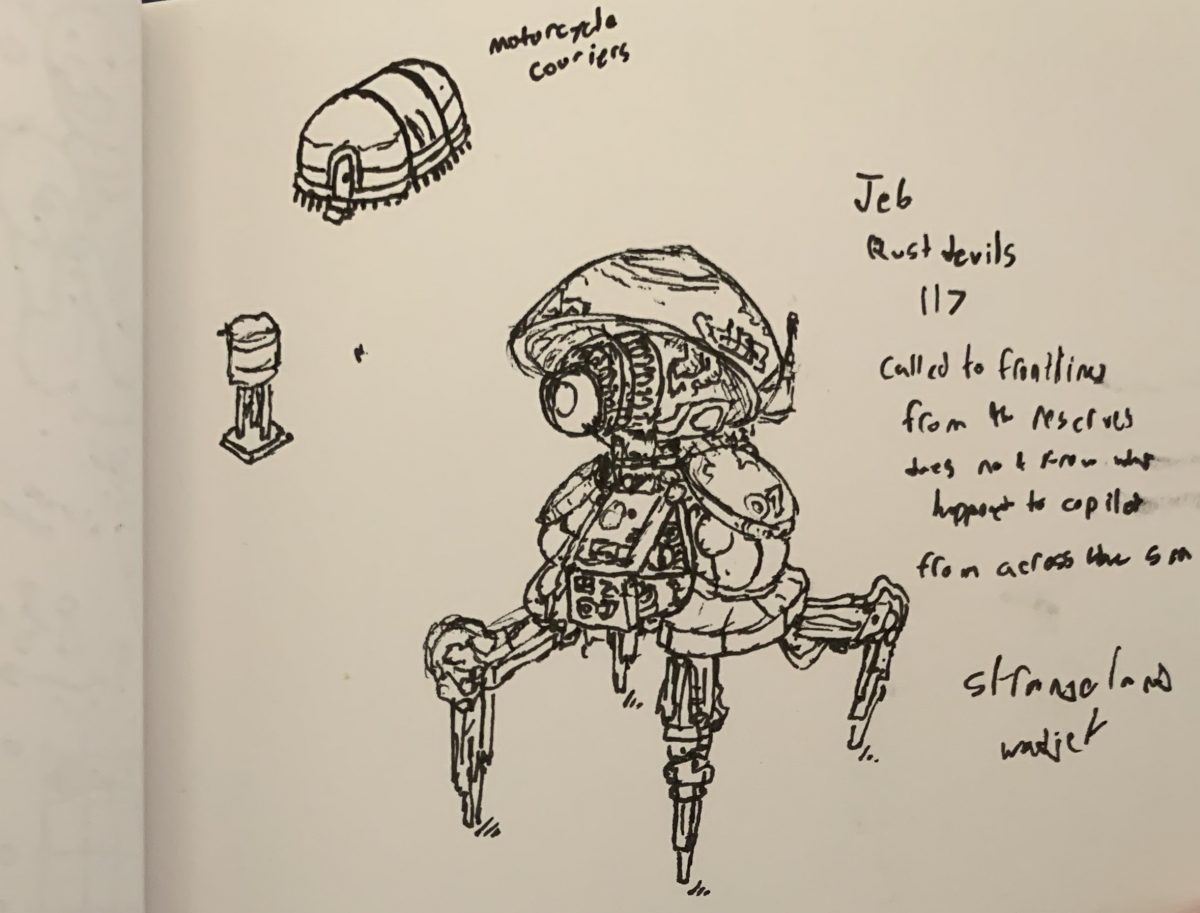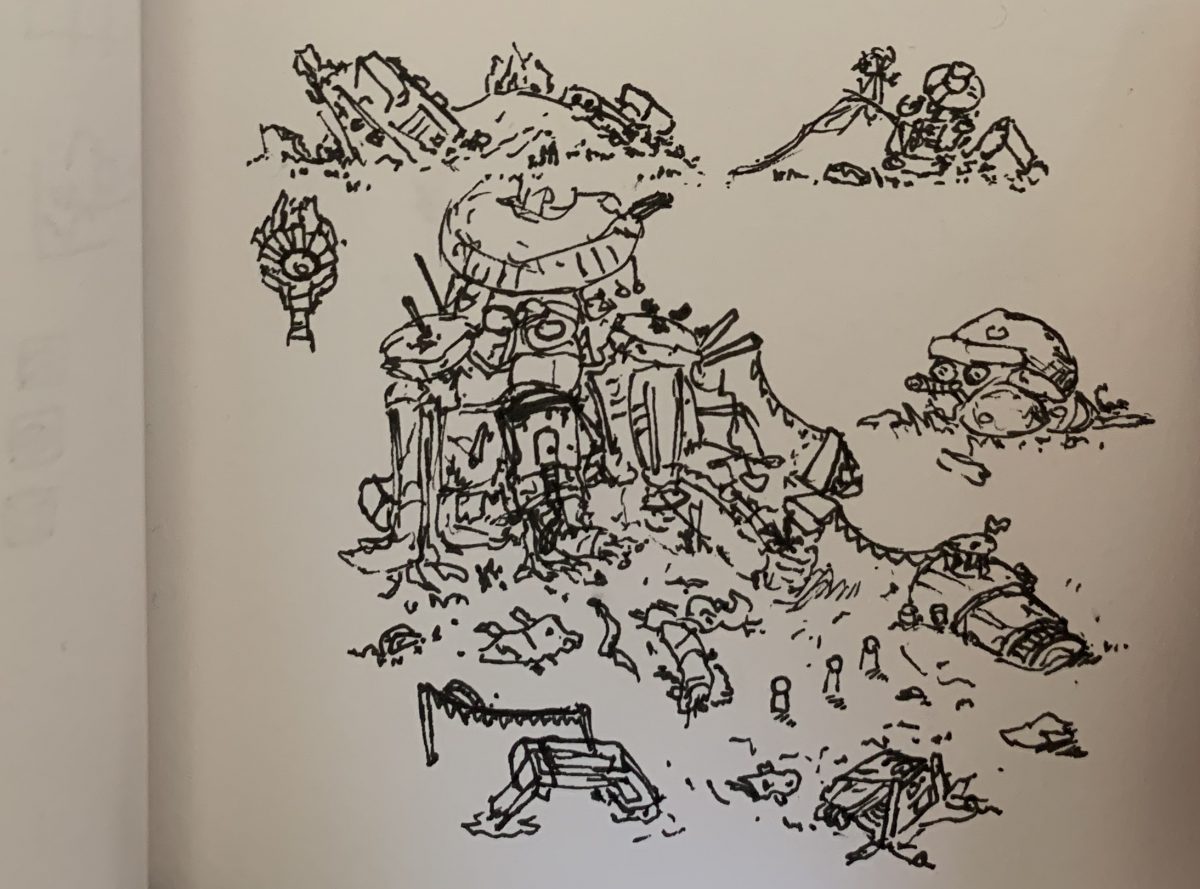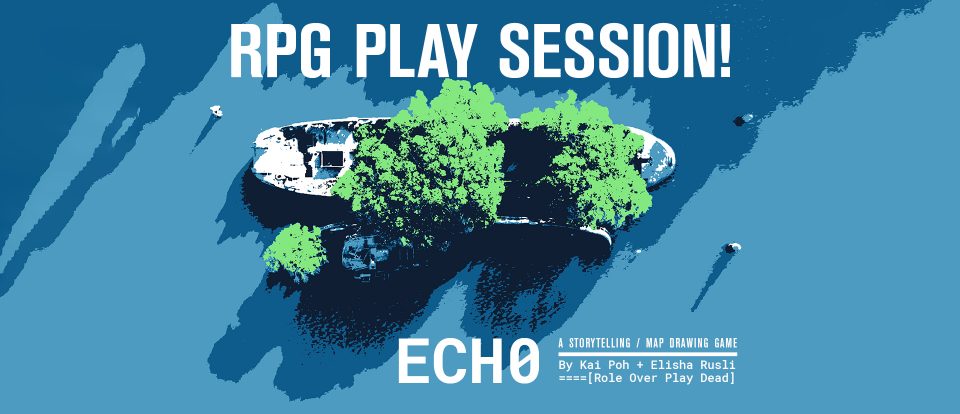
RPG Play Session Summary: Ech0
Posted on January 13th, 2022
by Meet Em Up Team
For our second RPG Play Session, we played Ech0; a Gamemaster-less map drawing and storytelling game. In Ech0, one player [me in this case] takes on the role of a fallen mech pilot from a war that ended many years ago, their mind saved in a small harddrive called an Ech0 drive. The other players take on the role of children during peacetime who find this Ech0 drive. In dialog with the pilot’s digital ghost, the players tell the stories of the long ruined mechs the children play around. Through storytelling and map drawing the players create a world at peace, and craft fragmented memories of a past war.
Ech0 was inspired by the designer’s childhood memory of stumbling upon the wreckage of a Japanese fighter jet. It is designed by Kai Poh with graphic design and layout by Elisha Rusli, collectively known as Role Over Play Dead. Beyond publishing their own games, Role Over Play Dead is a platform that highlights the Malaysian RPG scene through game reviews, creator interviews, and actual plays.
Although Echo is a GMless game, it does have two distinct roles. One person is the pilot, the rest are the children. Short questions provided in the game book help to inspire these characters. These prompts are phrased in the character’s present, long ago for the pilot and now for the children. The pilot only knows up to when they died, their last mission, who they loved and left, who they fought for. The children are created around what they were doing when they found the drive, how they know each other, and their names and ages. The world comes after, as a gap filled in between these disparate times and people.
Our pilot was Jeb, Rust Devils unit, Serial number 107. They were the 23 year old pilot of a medic mech, small unarmed mechs made squat and sturdy so they could carry downed mecha back to the back lines. They died in an ill fated push to take a mountain fortress. They were on the invading side.
Our group of children was large. Including me, we had ten players:
- IV Max. Age 13. Training to be an exoskeleton boxer. We found out later he delivered mail by motorcycle to neighboring towns
- Jo. Age 17. They always wanted to be a mech pilot, but couldn’t because of an accident. They don’t know what to do now.
- Not Here, Not there. A slimy thing. Otherwise average in all regards.
- TC. Age 17. Just came out of the closet. We found out later that they were interested in nuclear waste management.
- J6. An Ancient Android. They don’t know this. They present as a 6 year old boy, wearing a retro ballcap.
- Wes. Age 12. Thick Glasses. Likes collecting flora, fauna, and sea specimens.
- Cusbo JR. 11. Works at a hydroponics lab with his father Cusbo Sr. Wears a chemical pesticide brand t-shirt.
- Strubert. 13. Has a hustle hacking and modding animatronic pets.
- Duckegg. 9. A chef’s apprentice.
Our kids were from all walks of life, so the child players wanted to find the Ech0 drive in a place where all could feasibly come together. They decided they all hung out in the town’s scrap yard. So while exploring in the scrapyard over summer break, they saw a light blinking in an old pipe. Not Here Not There slimed in to check it out and retrieved Jeb’s Ech0 drive.
This is where world creation begins. The child players draw on a blank hex map where they found the drive. Then they decide if the world is Advanced or Low Tech, “Are there windmills?”
Because Jeb had mentioned that during the war their girlfriend broke up with them via a letter, our group decided we’d be a Low-tech world. All the androids, robot boxing rigs, and hydroponics set-ups became older and rustier. Beaten steel and lead paint. As we continued to make this world we found it had regressed even further from the time of the war, subsisting on scrap and cattle.
Ech0’s next prompt again starts small, asking the children to define their own hometown. This is the first introduction of random tables, a list of few entries where you roll a die to pick an entry at random as inspiration. In Ech0, each table has 9 results, 3 for low Tech, 3 for Advanced Tech, and 3 that work for either. We got a low tech one, and our town became a lonely oasis in dry scrubland.
The next prompt was large and we took the most time with it. Ech0 asks about the scars the war left on the land and the adults in our children’s lives. From this prompt, the children told Jeb that the Generation Ship that carried their invading army had crashed in this scrub land. Its titanic engine is now a climbable mesa, and the source of the town’s scrap. We learned of Cusbo’s grandfather’s service in the infantry. How the children’s land was once resource rich, but now stripped clean by war effort production. We learned too of a resort town—built on the hillside Jeb died trying to take—now a supplier of milk and butter beer to our children’s home town.
The form of Ech0 as a map drawing game, helps to draw out the material effects of war. It’s mentioned that there were artillery mechs during the war; so there should be craters. There was this huge loss of life from this Generation Ship crashing; there would be a memorial for it. So a small memorial is drawn in the center of a town in a crater. These legacies become inscribed on the map and slowly become connected to each other—either with roadways, rivers, or trade routes drawn on the map or by inspiring a new location.
In the last section of the Ech0, the children take the Ech0 drive around their world to the wreckage of various mechs. The details of these wrecks are also prompted by random tables; one for the mech’s description and one for its fate [how it’s used today]. Each child player rolls and leads the group to one of these sites. The evocative descriptions lead to further examination of the world’s present and the way the war is remembered. So a wreck leaned against a cliff face as sight of pilgrimage with incense and candles, leads into detailing the spirituality of our people and how the war affected it. A giant, mecha hand used as a gathering place, leads us tales of barbecuing food, seasonal festivals, and discarded beer cans. Through a wreck stripped and repurposed as a secret hideaway, we learn of smuggling born from over extraction and hardship. And from two wrecks, one from either side, strung together with flags of peace, we learn of the reconciliation and remembrance by those elders who took part in the war.
The final mech in Ech0 is always the pilots own. It is rolled on the same tables as the other wrecks, no greater or lesser than the ones that came before. We found that Jeb’s mech, its geodesic dome cockpit sticking out of the ground, had become a hidden play spot for children— covered in faded love notes and anti-war graffiti from when the wounds were still fresh. The children told Jeb of coming there, of taking turns sitting in their rotting pilot chair, of their helmet being taken home by a neighborhood kid. As Jeb’s battery began to die, the children told them of how they learned about the war in school. What they got wrong and what they got right. As the Ech0 drive failed, the children buried it, not too deep, thinking maybe other kids might dig it up years from now.
At the lab, I’ve tended to play and game master adventure-type games. Especially for new players, I tend to rely on making them light, silly, and weird. I’m going to play as Two Goblins in a trench coat, you’re gonna be a giant slug with a top hat, and we’re all gonna mess around. Ech0, I think, asks for a different tone: more reflective and grounded. Of course a lot of what made this session work was up to our players diving into this world, but in it’s few pages of rules Ech0 gives many tools to help this along.
By translating Echo’s real world inspiration into the realm of mecha, it gives a place for all the weird and hyperbolic ideas to go, especially in character creation. Yes there are robots a kilometer high, yes there’s android kids and alien slime, yes there’s a crashed spaceship. But the game text, with its focus on fishing boats, grazing cattle, quarrying machines, rust and ritual, asks that all these things be brought back down to earth. If there’s a crashed spaceship, what happened to those who lived under it, how do you rebuild from that, how do you memorialize it? The action of most mecha fiction is a war or battle, in Ech0 this war is long ended. The world is at peace. All the trappings have a place to go, but they’re not used in the same way. You might have a giant railgun, but Ech0 doesn’t care how powerful it is. It just cares about what happened to the spent shells.
Ech0’s framing creates a wide open space for play. By framing the conversation across disparate times, the intervening years are open to be filled in. Further, because both sides of this conversation have imperfect information—the pilot only knows the course of the war up until their demise, and the children only know the present at peace and how they learned about the war—there’s space for disagreement, for ambiguity, for facts lost to history or deliberate misinformation. Further, by having the information on the present come from children, there’s more freedom for wondering, misunderstanding, and getting it wrong. They didn’t experience the war, they experienced its wrecks as playthings and monuments.
By being GM-less Ech0 distributes the game text to all at the table. If the conversation lags, Ech0 fills the gap with clear images and pointed questions, moving one’s imagination into new places, and digging deeper into the player’s feelings about this world.
Ech0 also flips the structure of a game-mastered RPG. Although Ech0 is gmless in that there’s no player at the table with final say over the world or its inhabitants, Ech0 does have two distinct roles, one performed by a single player, the pilot, and one performed by everyone else, the children. This structure also differs from many other GMless games, where either all players have the same role or roles are frequently switched in turn. Because of this, I’d almost describe Ech0 as a reverse game-mastered game. Here it is the single player, the pilot, being led on an adventure across the children’s world. It is the group with more members that largely describes the world, though both groups ask questions of each other. I think this reversal is further exemplified by the form Ech0’s rules and gameplay take. Ech0 relies heavily on prompts from random tables and the main inscription of play is done by the child players drawing on a hex map. These actions mirror, to me, the session prep traditionally done by a game master for an RPG, using tables and map drawing to generate a world for the players to interact with. As a frequent game master, who normally does these things in isolation, it’s compelling to see this process of imaginative interaction opened up to the players, and become a mode of collective play itself.
Although Ech0 is a wide open game that poses more questions than it gives answers, I think it’s from its specificity and clear images that it draws its strength. No matter whether the pilot invaded from another planet or the war was fought between neighboring towns, there’s always rust or bird droppings or scrawled graffiti. There’s always scars and new growth.

